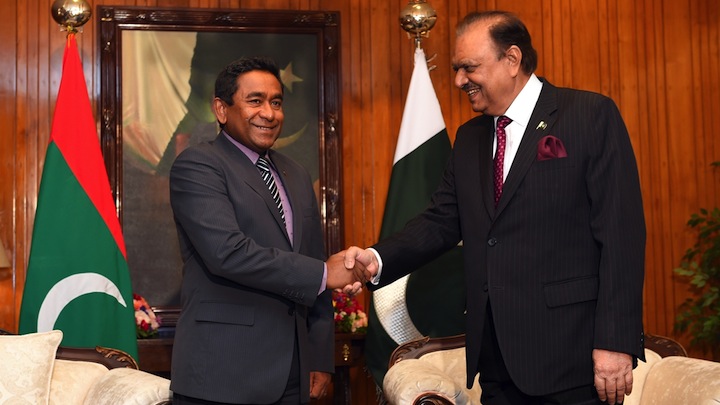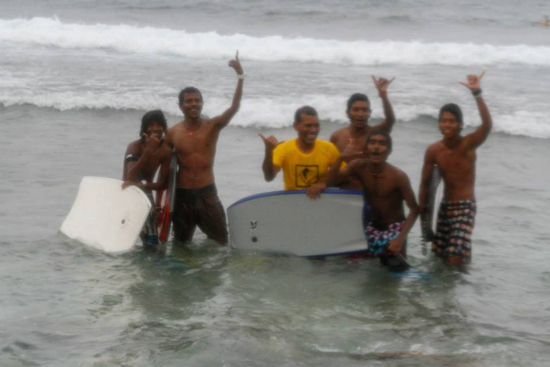The Maldivian Democratic Party (MDP) on Friday launched its youth, sports and entertainment policy, dubbed ‘Majaa Kurun Birakaa Nula’: ‘entertainment without fear’.
Despite the wet weather, the party’s presidential candidate Mohamed Nasheed along with senior party members and hundreds of supporters gathered at the Raalhugandu area Male in yellow athletic attire.
Senior party members followed Nasheed’s lead in taking part in several sport activities organised in the area, including futsal, volleyball, table tennis, baton racing and bodyboarding.
Speaking at the function to inaugurate the policy, the former President promised more sports facilities and technical assistance for athletes in a future MDP-led government, while also promising that during his five year term the government would facilitate more public participation in sports.
According to Nasheed, the policy also includes the renovation and maintenance of football grounds in the Maldives.
Young people represent a potential election-swinging demographic in the September 7 Presidential Election. With 65 percent of the population were already aged under 30 at the time of the 2006 census, the number of eligible voters have 15 percent since 2008’s presidential election. The MDP has traditionally enjoyed strong support from young people, although prior to its February 7 ousting was challenged by rising political apathy among younger voters.

“We need to put our efforts into empowering the young people of this country. If we isolate them and let them fall apart, there is no way we can bring about much needed development of the country,” Nasheed said at the policy launch, promising “renewed-hope” for the young generation: “This is not simply a sports policy, it is also an entertainment policy.”
The MDP’s entertainment election promises include developing 40 turf stadiums throughout the country, development of high standard stadiums with modern-day training facilities, netball courts and courts for ‘Bashi’ – a traditional sport played by many women – across 60 islands.
“We will also develop the current national sports building as an ‘associations’ house’. In this Associations House, local sports associations will be given space to set up their administrative offices, while accommodation and boarding facilities will also be developed for international athletes and teams who visit the country,” he said.
Nasheed – who heads the country’s single largest political party both in terms of membership and parliamentary representation – also announced the development of a ‘sports resort’ – a sports-themed holiday resort specially designed to host famous international football clubs and other sports personalities who wish spend their off-season vacation in the country.
The said resort, Nasheed promised, would have quality in-house training facilities, practice grounds and gymnasiums for such teams.
Other plans include investment in youth development and skills development under the guidance of a National Sports Institute, and the establishment of a sports school.
“We will open the opportunity to develop a sports school through public-private partnership (PPP). We would also establish a special pension scheme for athletes who represent the country abroad as part of their retirement support,” Nasheed promised.
Responding to sarcastic remarks over the policy from his political opponents, Nasheed assured young people that the Special Operations (SO) officers of the police – known for their rough handling of MDP protests – would not be allowed to barge in and “ruin the fun”.
“Young people will decide what songs they wish to dance to,” Nasheed told the ecstatic young crowd.

Nasheed “a monster”, MDP “promoting homosexuality”: rival parties
The announcement of the MDP’s youth policy fueled harsh criticism from Nasheed’s opponents. Government-aligned parties currently backing the government of President Mohamed Waheed Hassan were quick to launch attacks on the policy.
While addressing a small campaign rally, the business tycoon and presidential hopeful Gasim Ibrahim – who also heads the Jumhoree Party (JP) – described Nasheed as a “monster” who had gone “crazy” with his “crazy talks to fool the people”.
Dismissing the MDP’s youth policy, Gasim challenged Nasheed’s academic qualifications and described him a ‘Jaahil’ (ignorant) who could not read the cover of the constitution.
“He doesn’t understand what the law says, so a crazy person like him may say that he would give the opportunity for people to limitlessly entertain themselves. Look, it is not something Allah has given us human beings,” Gasim said.
The business tycoon – who finished the last presidential election in fourth place – claimed Nasheed had done every “despicable act ever to be found in the world”.
“He thinks we, the people, are fools to believe such rubbish. Actually, he seriously may think that we are fools. He has now got the mindset of a monster,” said the resort owner.
Former Spokesperson for President Waheed and current spokesperson for his Gaumee Ithihaad Party (GIP), Abbas Adil Riza, joined Gasim in denouncing the policy but had a different interpretation.
Speaking on the government-aligned television station DhiTV, Riza alleged the MDP was trying to “promote illicit activities such as homosexuality and sodomy” under the façade of its youth policy.
The current state minister of finance – who formally worked with the MDP but left after failing to win a party ticket to contest in 2009 parliamentary elections – said Maldivians had long been having “fun without fear” and claimed MDP re-emphasising the concept could be interpreted as pledging to “facilitate such devious acts”.
Meanwhile, the Progressive Party of Maldives (PPM) – headed by Maldives’ former autocratic ruler Maumoon Abdul Gayoom – claimed the youth policy was a tactic by the MDP to “win the votes of 15,000 or so drug addicts”.
PPM Spokesperson MP Ahmed Mahloof told local media authorities should take serious concern over what Nasheed was planning to do should he come to power.
“Our society is facing huge problems due to narcotic abuse, and then Nasheed comes out and says that in his government the young people can ‘enjoy without fear’,” Mahloof said.
He also said that policies such as ‘entertainment without fear’ gave the impression the party was trying to promote drugs and substance abuse.
“That is why we need to seriously think what type of entertainment or enjoyment they are allowing in the country,” he said.
Mahloof promised that his party would provide “better solutions” for youth.
Enjoy responsibly
Responding to the criticism, former Minister of Youth and Sports during Nasheed’s presidency, Hassan Latheef, told Minivan News that MDP’s policy did not promote breaking laws and anti-Islamic behavior.
“Maybe for Abbas Adil Riza having fun is simply a group of men getting together for a dance wearing excessively thin white sarongs. We are saying that entertainment can be carried out within the boundaries of the law and Islam. We are not promoting drug abuse or homosexuality at all,” Latheef said.
He explained that a seven year old who goes to play with others among their age and interacts with society produces better results at school than a boy who is not allowed to go out but is given video games at home.
Latheef said young people were subjected to derogatory treatment by police simply because of their appearance, and that the MDP was trying to remove the fear that had been cast upon youth during the 30 year reign of Gayoom.
“Like the President said, we will not let the police ruin the fun for young people. We will not let the young people be discriminated against like that. What we are saying is that the government should facilitate development and entertainment for young people,” he added. “This is a solution to a lot of problems we now face in the society.”
“Entertainment without fear does not mean letting our kids smoke or allow them to take drugs. It is simply freeing them from fear, and that doesn’t mean we are giving them the chance to break the law,” he added.
Despite the criticism, the policy has received strong support across social media networks such as Twitter and Facebook, with the hash tags #BirakaNula and #Majakurun associated with the title of the policy quickly gaining popularity among the Maldivian twitter community.
Likes (0)Dislikes
(0)Dislikes (0)
(0) 



